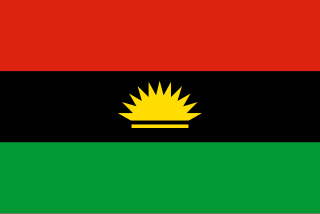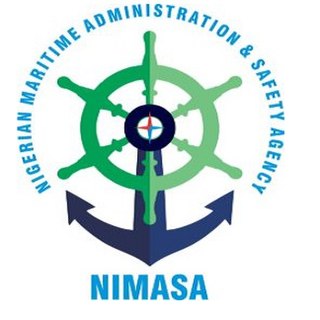Related Research Articles

Nigeria, officially the Federal Republic of Nigeria, is a country in West Africa. It is situated between the Sahel to the north and the Gulf of Guinea to the south in the Atlantic Ocean. It covers an area of 923,769 square kilometres (356,669 sq mi), and with a population of over 230 million, it is the most populous country in Africa, and the world's sixth-most populous country. Nigeria borders Niger in the north, Chad in the northeast, Cameroon in the east, and Benin in the west. Nigeria is a federal republic comprising 36 states and the Federal Capital Territory, where the capital, Abuja, is located. The largest city in Nigeria is Lagos, one of the largest metropolitan areas in the world and the largest in Africa.

Sub-Saharan Africa, Subsahara, or Non-Mediterranean Africa, is the area and regions of the continent of Africa that lie south of the Sahara. These include Central Africa, East Africa, Southern Africa, and West Africa. Geopolitically, in addition to the African countries and territories that are situated fully in that specified region, the term may also include polities that only have part of their territory located in that region, per the definition of the United Nations (UN). This is considered a non-standardized geographical region with the number of countries included varying from 46 to 48 depending on the organization describing the region. The African Union (AU) uses a different regional breakdown, recognizing all 55 member states on the continent—grouping them into five distinct and standard regions.

Biafra, officially the Republic of Biafra, was a partially recognised country in West Africa that declared independence from Nigeria and existed from 1967 until 1970. Its territory consisted of the former Eastern Region of Nigeria, predominantly inhabited by the Igbo ethnic group. Biafra was established on 30 May 1967 by Igbo military officer and Eastern Region governor C. Odumegwu Ojukwu under his presidency, following a series of ethnic tensions and military coups after Nigerian independence in 1960 that culminated in the 1966 anti-Igbo pogrom. The Nigerian military proceeded to attempt to reclaim the territory of Biafra, resulting in the start of the Nigerian Civil War. Biafra was formally recognised by Gabon, Haiti, Ivory Coast, Tanzania, and Zambia while receiving de facto recognition and significant military support from France. After nearly three years of war, during which around two million Biafran civilians died, President Ojukwu fled to Ivory Coast in exile as the Nigerian military was approaching the capital of Biafra. Philip Effiong became the second president of Biafra, and he oversaw the surrender of Biafran forces to Nigeria.
Roberta "Bobbie" Kevelson was an American academic and semiotician. She was an acknowledged authority on the pragmatism theories of Charles Sanders Peirce.

The history of banking began with the first prototype banks, that is, the merchants of the world, who gave grain loans to farmers and traders who carried goods between cities. This was around 2000 BC in Assyria, India and Sumer. Later, in ancient Greece and during the Roman Empire, lenders based in temples gave loans, while accepting deposits and performing the change of money. Archaeology from this period in ancient China and India also shows evidence of money lending.

Chief James Ajibola Idowu IgeSAN ; 13 September 1930 – 23 December 2001), simply known as Bola Ige, was a Nigerian lawyer and politician. He served as Federal Minister of Justice of Nigeria from January 2000 until his assassination in December 2001. He previously served as governor of Oyo State from 1979 to 1983 during the Nigerian Second Republic.

The Central Bank of Nigeria is the central bank and apex monetary authority of Nigeria established by the CBN Act of 1958 and commenced operations on 1 July 1959. The major regulatory objectives of the bank as stated in the CBN Act are to: maintain the external reserves of the country, promote monetary stability and a sound financial environment, and act as a banker of last resort and financial adviser to the federal government. The central bank's role as lender of last resort and adviser to the federal government has sometimes pushed it into murky regulatory waters. After the end of imperial rule, the desire of the government to become proactive in the development of the economy became visible, especially after the end of the Nigerian civil war, the bank followed the government's desire and took a determined effort to supplement any show shortfalls, credit allocations to the real sector. The bank became involved in lending directly to consumers, contravening its original intention to work through commercial banks in activities involving consumer lending.
The Panic of 1847 was a major British commercial and banking crisis, possibly triggered by the announcement in early March 1847 of government borrowing to pay for relief to combat the Great Famine in Ireland. It is also associated with the end of the 1840s railway industry boom and the failure of many non-bank lenders. The crisis was composed of two phases, one in April 1847 and one in October 1847, which was more serious and known as 'The Week of Terror'.

The law of Gibraltar is a combination of common law and statute, and is based heavily upon English law.
Dr. Paul Agbai Ogwuma is a Nigerian banker who was Governor of the Central Bank of Nigeria between 1993 and 1999 during the military regime of General Sani Abacha and his successor General Abdulsalami Abubakar.

The Federal Reserve Reform Act of 1977 enacted a number of reforms to the Federal Reserve, making it more accountable for its actions on monetary and fiscal policy and tasking it with the goal to "promote maximum employment, production, and price stability". The act explicitly established price stability as a national policy goal for the first time. It also required quarterly reports to Congress "concerning the ranges of monetary and credit aggregates for the upcoming 12 months." It also modified the selection of the Class B and C Reserve Bank Directors. Discrimination on the basis of race, creed, color, sex, or national origin was prohibited, and the composition of the directors was required to represent interests of "agriculture, commerce, industry, services, labor and consumers". The Federal Reserve Act, which created the Federal Reserve in 1913, made no mention of services, labor, and consumers. Finally, the act established Senate confirmation of chairmen and vice chairmen of the Board of Governors of the Federal Reserve. The Federal Reserve Reform Act made the Federal Reserve more transparent to Congressional oversight.

Newspapers published in Nigeria have a strong tradition of the principle of "publish and be damned" that dates back to the colonial era when founding fathers of the Nigerian press such as Nnamdi Azikiwe, Ernest Ikoli, Obafemi Awolowo and Lateef Jakande used their papers to fight for independence.

The Nigerian Maritime Administration and Safety Agency (NIMASA), formerly the National Maritime Authority (NMA) is responsible for regulations related to Nigerian shipping, maritime labor and coastal waters. The agency also undertakes inspections and provides search and rescue services. The governing board includes representatives of the Ministry of Labour, the Ministry of Transport and the Navy.

The Law of Nigeria consists of courts, offences, and various types of laws. Nigeria has its own constitution which was established on 29 May 1999. The Constitution of Nigeria is the supreme law of the country. There are four distinct legal systems in Nigeria, which include English law, Common law, Customary law, and Sharia Law. English law in Nigeria is derived from the colonial Nigeria, while common law is a development from its post-colonial independence.

Nigerian nationality law is regulated by the Constitution of Nigeria, as amended, and various international agreements to which the country is a signatory. These laws determine who is, or is eligible to be, a national of Nigeria. The legal means to acquire nationality, formal legal membership in a nation, differ from the domestic relationship of rights and obligations between a national and the nation, known as citizenship. Nationality describes the relationship of an individual to the state under international law, whereas citizenship is the domestic relationship of an individual within the nation. Commonwealth countries often use the terms nationality and citizenship as synonyms, despite their legal distinction and the fact that they are regulated by different governmental administrative bodies. Nigerian nationality is typically obtained under the principal of jus sanguinis, i.e. by birth to parents with Nigerian nationality. It can be granted to persons with an affiliation to the country, or to a permanent resident who has lived in the country for a given period of time through naturalisation.

From 1960 to 1963, Nigeria was a sovereign state and an independent constitutional monarchy. Nigeria shared the monarch with Australia, Canada, United Kingdom, and certain other sovereign states. The monarch's constitutional roles were mostly delegated to the governor-general of Nigeria.
The law of Hungary is civil law. It was first codified during the socialist period.
Anti-corruption comprises activities that oppose or inhibit corruption. Just as corruption takes many forms, anti-corruption efforts vary in scope and in strategy. A general distinction between preventive and reactive measures is sometimes drawn. In such framework, investigative authorities and their attempts to unveil corrupt practices would be considered reactive, while education on the negative impact of corruption, or firm-internal compliance programs are classified as the former.
The National Commission for Women (NCW) was a Nigerian organization established by the Federal Government of Nigeria in 1989, and charged with promoting the welfare of women in Nigeria. The NCW was a predecessor of the Federal Ministry of Women Affairs and Youth Development.
Cryptocurrency in Nigeria describes the extent of cryptocurrency use, social acceptance and regulation in Nigeria.
References
- Trendtex v Central Bank of Nigeria (1977) 64 International Law Reports 111 at 116, 118, 136, 137 and 147, CA Google Books
- Mwalimu, Charles. The Nigerian Legal System. Peter Lang. 2009. Volume 2. Page 602 et seq.